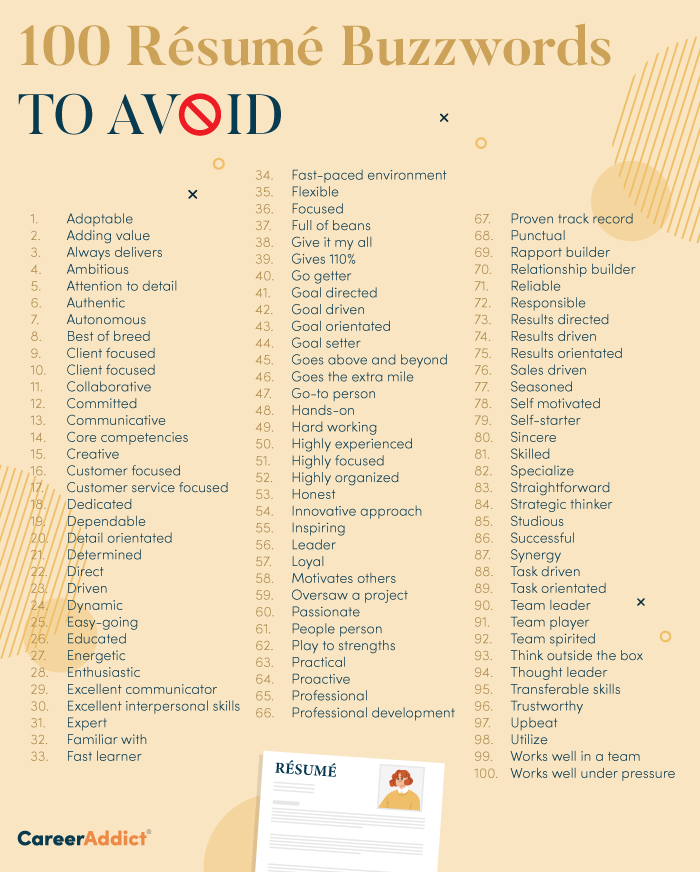Résumé writing can be a tricky part of your job search. The purpose of a résumé is to make you stand out as the ideal candidate for a job. It needs to focus on your strengths, qualities and relevant experience that sets you apart, demonstrating exactly what work experience and skills you have that makes you a strong candidate. For so many, this is watered down by the inclusion of overused buzz words, which have the opposite effect and actually make each résumé blend into the next.
Certain words and phrases have become so common, that having them on your résumé can be harmful and take you closer to the trash pile, which is not what you want. Using buzzwords in place of really demonstrating skills and experience with examples is one of the biggest résumé mistakes. But don’t worry, in this article, we will let you know the buzzwords that you should avoid when writing your résumé and let you into the secret of what you can use instead.
What are résumé buzzwords?
Résumé buzzwords are words and phrases that have become used so frequently that they have lost their meaning. They have become clichés and are unoriginal, vague and show a lack of thought. Lots of them are fluff and filler and really mean nothing at all.
A phase such as “results driven” is an example of a buzzword. It is used frequently in résumé summaries, but what does it really convey? Most people want to achieve the results they set out for, otherwise, they are not very desirable as a candidate, so really this is just common sense.
How do they harm your résumé?
Using words and phrases that are overused isn’t impressive and doesn’t make you stand out. If your résumé is in a stack for a hiring manager to work through and you use the same buzzwords as the others it means you just blend into the pile — that’s if it even gets through the applicant tracking system!
Recruiters might even discard your résumé if it is full of buzzwords because it demonstrates to them that you lack imagination and effort, and it doesn’t actually tell them anything about you. A recruiter is looking to read your résumé and find out exactly how you fit with the role they are advertising and buzzwords have the opposite effect.
Buzzwords to avoid
Buzzwords have become so commonplace, that it might be difficult to even decipher what is a buzzword and what isn’t. To make this easier for you, here is a list of 100 buzzwords that you should avoid using in your skills section (and everywhere else) if you want to make a good impression:
- Adaptable
- Adding value
- Always delivers
- Ambitious
- Attention to detail
- Authentic
- Autonomous
- Best of breed
- Client focused
- Client focused
- Collaborative
- Committed
- Communicative
- Core competencies
- Creative
- Customer focused
- Customer service focused
- Dedicated
- Dependable
- Detail orientated
- Determined
- Direct
- Driven
- Dynamic
- Easy-going
- Educated
- Energetic
- Enthusiastic
- Excellent communicator
- Excellent interpersonal skills
- Expert
- Familiar with
- Fast learner
- Fast-paced environment
- Flexible
- Focused
- Full of beans
- Give it my all
- Gives 110%
- Go getter
- Goal directed
- Goal driven
- Goal orientated
- Goal setter
- Goes above and beyond
- Goes the extra mile
- Go-to person
- Hands-on
- Hard working
- Highly experienced
- Highly focused
- Highly organized
- Honest
- Innovative approach
- Inspiring
- Leader
- Loyal
- Motivates others
- Oversaw a project
- Passionate
- People person
- Play to strengths
- Practical
- Proactive
- Professional
- Professional development
- Proven track record
- Punctual
- Rapport builder
- Relationship builder
- Reliable
- Responsible
- Results directed
- Results driven
- Results orientated
- Sales driven
- Seasoned
- Self motivated
- Self-starter
- Sincere
- Skilled
- Specialize
- Straightforward
- Strategic thinker
- Studious
- Successful
- Synergy
- Task driven
- Task orientated
- Team leader
- Team player
- Team spirited
- Think outside the box
- Thought leader
- Transferable skills
- Trustworthy
- Upbeat
- Utilize
- Works well in a team
- Works well under pressure
What to use instead
There are lots of ways you can convey your skills and experience on your résumé without resorting to buzzwords. Being very specific in highlighting your achievements and results will mean that instead of having to resort to phrases like “I am results driven” you can simply give an example to demonstrate how you worked hard to meet your targets without having to actually use the phrase.
When doing this, make sure you use action verbs. These are well placed in your summary and professional experience section and are highly effective in showing that you are proactive and that you follow things through. Make sure you add a real example as well to show that you are not just listing attributes. Instead of saying, “I am highly organized” you can say “I organized… resulting in…”.
Effective action words include:
|
|
|
|
Achieved |
Directed |
|
Introduced |
Managed |
|
Collaborated |
Analyzed |
|
Organized |
Planned |
|
Identified |
Executed |
|
Performed |
Oversaw |
|
Implemented |
Operated |
As well as using action verbs, think about taking keywords from the job description of the role you’re applying for. Doing this will ensure that you’re using the words that the recruiter is looking for and thinks are important. This will be a much more effective approach than using buzzwords and clichés.
Remember that your résumé is a way of selling yourself and although you want to sound impressive and professional, it’s still important to sound like yourself. Think about how you would talk about yourself. It’s unlikely that you would say “I’m a highly experienced, passionate, go-getter with a proven track record of collaboration and engagement.” This description is so buzzword heavy that it actual tells a person very little about you.
Just take some extra time when writing your résumé to check for these words, and we promise it'll make it ten times better.
We made this infographic with all 100 words/phrases to avoid, so you don't have to remember them all:

Key takeaways
Buzzwords are overused phrases and words that appear as more of a cliché than giving any real information to an employer and should be avoided. It’s not always easy to work out which words are buzzwords, so a general rule is to give examples and use action verbs instead of labels. For example:
No: “I am results orientated with a passion for collaboration.”
Yes: “I achieved the customer standard award by exceeding my weekly targets by linking with another team and sharing responsibilities.”
Using buzzwords is easy to do but it’s a bad trap to fall into because your potential recruiters are tired of reading the same thing over and over again. As a jobseeker, you need to use your résumé to stand out and set yourself apart from other applicants during the recruitment process. Take keywords from the job advert, think about your achievements and focus on demonstrating those.
After you’ve written your résumé, give it a proofread to check for any buzzwords that have slipped through and change them for action words and real-life examples. This will ensure that you have a great résumé that represents you and your skills and experience, rather than something generic that could have been submitted by any other applicant.
Have you gone through your résumé to check for buzzwords and clichés? What did you find? Let us know how you improved it in the comments!


